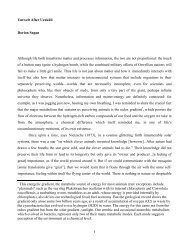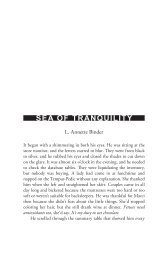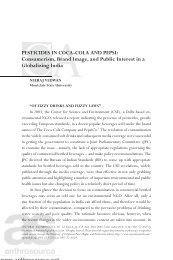The Human is More than Human - Cultural Anthropology
The Human is More than Human - Cultural Anthropology
The Human is More than Human - Cultural Anthropology
Create successful ePaper yourself
Turn your PDF publications into a flip-book with our unique Google optimized e-Paper software.
scient<strong>is</strong>t stomps h<strong>is</strong> wading boots); when the danger passes, the animated algae, the<br />
green worms then reemerge into the sunlight. <strong>The</strong> “planimal” <strong>is</strong> fed by the green<br />
building of its body, the living architecture that it gardens and which feeds it from<br />
within.<br />
It seems unlikely that any cosmic deity arranged for the partners that are C.<br />
roscoffens<strong>is</strong> to come together but they did, partially of their own accord, and they<br />
probably would have looked odd anyway on Noah'ʹs Ark.<br />
Identifiable new behaviors, combined skills and physiologies, and even multigenome<br />
personalities also affect us. <strong>Human</strong> gut microbiota are not simply hangers-‐‑on but<br />
influence the timing of maturation of our intestinal cells, our internal nutrient supplies<br />
and d<strong>is</strong>tribution, our blood vessel growth, our immune systems, and the levels of<br />
cholesterol and other lipids in our blood (Brown 2010). <strong>The</strong>y also—partly because of the<br />
presence of neurons in the mammalian intestinal tract, and the communication between<br />
gut and brain—influence human mood. Lab work with Campylobacter jejuni shows that<br />
th<strong>is</strong> bacterium increases increased anxiety in mice, whereas the soil bacterium<br />
Mycobacterium vacca inside them cheers them up. In people it has been suggested that<br />
yogurt with live cultures, for example with bifidobacteria, improves our sense of well<br />
being.<br />
Toxo<br />
Toxoplasma gondi <strong>is</strong> a prot<strong>is</strong>t notorious for infecting pregnant mothers who may contract<br />
it from kitty litter. From the mother Toxoplasma moves to the fetus, often devouring it<br />
and leading to a m<strong>is</strong>carriage. Toxoplasma gondi sexually reproduces in bodies of<br />
members of the Felidae family, notably house cats. But mice, usually afraid of cats, lose<br />
their fear when their brains become infected with Toxoplasma. Also, and curiously, they<br />
become sexually attracted to feline urine.<br />
Toxoplasma also infects large numbers of humans. Even though a possessor of<br />
Toxo may not know it'ʹs there, he or she can be affected by it. Toxoplasma infection in<br />
men correlates with enhanced r<strong>is</strong>k-‐‑taking and jealousy. An index of the r<strong>is</strong>k-‐‑taking<br />
behavior <strong>is</strong> provided by the fact that males in car and motorcycle accidents are more<br />
likely to test Toxoplasma-‐‑positive (e.g., Flegr et al 2009). Toxo-‐‑men are more likely to be<br />
unfriendly, unsociable, and withdrawn. Even if bereft of obvious symptoms, men who<br />
carry Toxoplasma are less likely, relative to controls, to be found attractive to women.<br />
Women are another story. Women with Toxoplasma are more likely to be judged<br />
outgoing, friendly, and conscientious—and prom<strong>is</strong>cuous. <strong>The</strong>re <strong>is</strong> of course the<br />
complication of the stereotype of the woman in the house who lives alone with all the<br />
cats. <strong>The</strong> caricature of such a woman <strong>is</strong> not of someone outgoing. Perhaps Toxo'ʹs effects<br />
alter with age.<br />
However confounding, Toxo'ʹs effects seem real. Toxoplasma makes enzymes<br />
6






